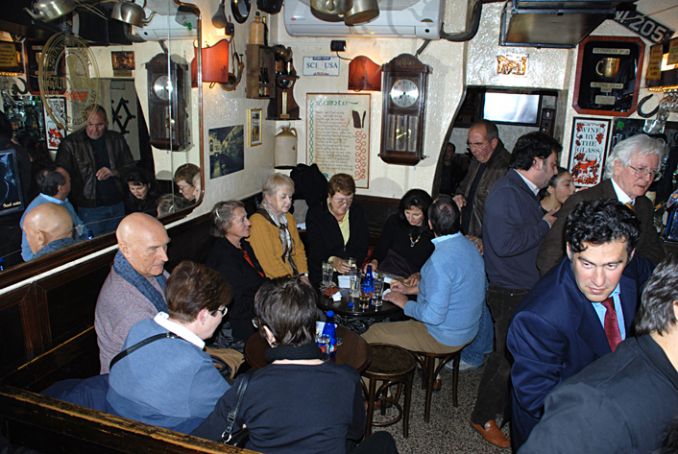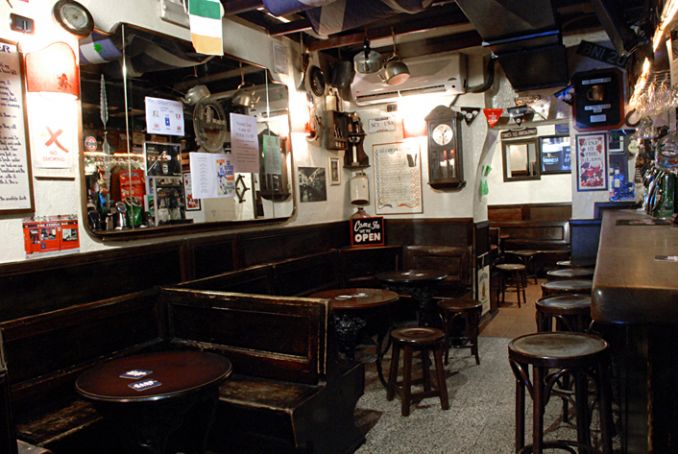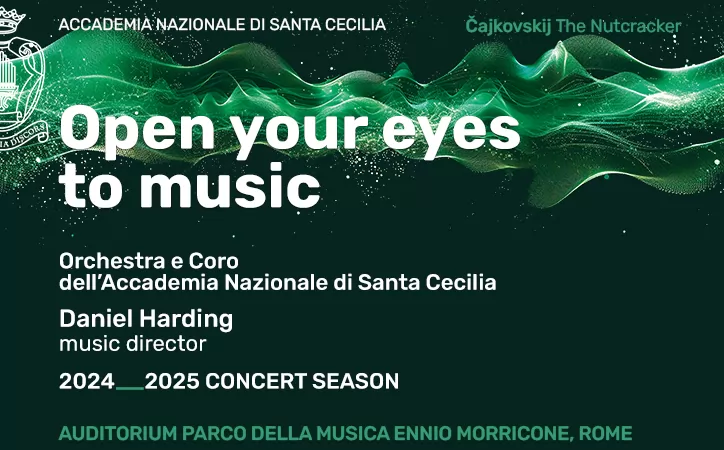Rome's oldest Irish pub has been an expat oasis for four decades.
Andy Devane
"There were queues outside every night,” Gino Bottigliero reminisces with a nostalgic twinkle in his eye, “we were packed from the start.” With his silver moustache and darting eyes, Bottigliero's face is synonymous with the bar he co-founded four decades ago, long before mainland Europe embraced the now ubiquitous Irish pub.
Over the chatter and hum of the bar's front parlour, Bottigliero recalls the autumn night in 1976 when he launched the Fiddler's Elbow – Italy's first Irish bar – alongside business partners Orazio Cancanelli and Antonio Shorthose. Crucially, Bottigliero's wife, Mary Pyne from Dublin, was also by his side, providing an authentic link between curious Romans and the city's expats.
Novel idea
The idea to open the pub came about when Bottigliero worked with Shorthose, whose father was English, at Singapore Airlines in Fiumicino airport. Shorthose was a “hugely important figure” behind the novel plan – Bottigliero says – and what a novelty it was.
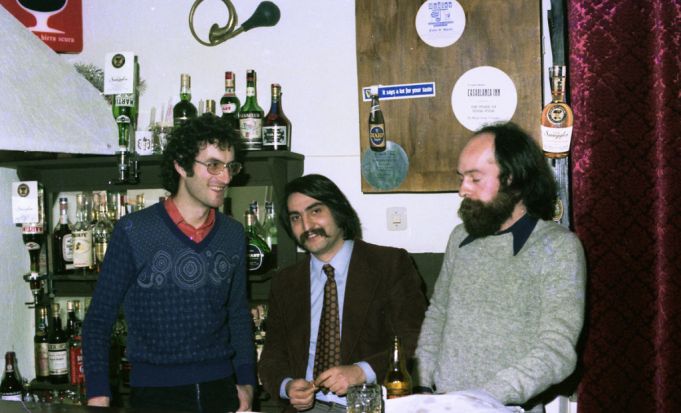
Until the advent of Fiddler's Elbow, foreigners living in Rome had nowhere to go for a libation, let alone a pint of the black stuff. “The notion of meeting for a drink in the evening, outside of a restaurant, was unheard of in Rome at the time,” says Bottigliero. That all changed when word began trickling out about Fiddler's, then located on Via Sforza in the capital's Monti district.
At the beginning its main customers were expats – many from the city's Food and Agriculture Organization (FAO) – happy at the thought of a night of beer and banter. In those pre-internet days, tourists had difficulty finding the bar, which was initially classed as a “cultural association”, meaning it required a membership card and was obliged to close one night a week. Bottigliero says that early clients also included "American and Australian soldiers, left over from the Vietnam war – half crazy and a bit shocked."
Priests and seminarians
However the bar's “most important” clientele, according to Bottigliero, were priests and seminarians from Ireland and Britain, including noted traditional Irish musicians. There was enthusiastic support from the students of the Pontifical Irish College, as well as a handful from the Venerable English College, and the Benedictines at S. Anselmo. However it was the Beda College, for older seminarians, that provided the most interesting characters, Bottigliero maintains. Beda regulars included the nephew of Winston Churchill, the brother of a serving British Foreign Secretary, a descendant of Oliver Cromwell, a man who gave up his string of night clubs to serve God, and the son of the inventor of the zip, who waived his royalties for a greater glory.
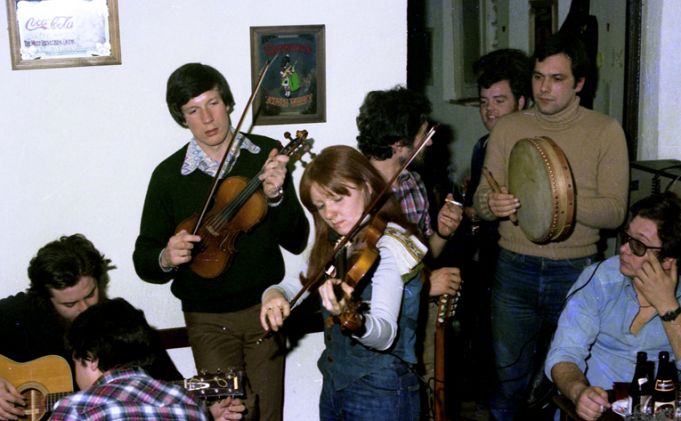
By 1979 the growing number of customers required larger premises and so the pub switched to its current address on nearby Via dell’Olmata 43, where Monti borders the Esquilino, in the shadow of the Basilica di S. Maria Maggiore. It was around this time that Shorthose left, for health reasons, and was replaced as a partner by English rock musician Richard Sherwood.
Located on a quiet side-street between a convent and the Guardia di Finanza, the new venue had its own stories even before the Fiddler's Elbow sign was hung outside. A former trattoria once popular with the city's Russian diaspora, it was said that Lenin had a meal here during a visit to Rome in 1911.
Super-boom
As Fiddler's reputation grew, so began a glorious new era, a “super-boom”, says Bottigliero: “We had a monopoly for years, from 1976 to 1986, even later.” The pub was the first in Rome to serve draft Guinness, in 1981, as well as the first to employ Irish staff, while the hordes of customers were vetted by bouncers, another first for the capital. In 1985 Fiddler's availed itself of a loophole in its cultural association status that so long as it was not open all day, it could open seven nights a week.
Several other Irish pubs followed suit, including Four Green Fields in Prati, which opened in 1980, and Druid's Den which Bottigliero opened with his brother Tonino, around the corner on Via di S. Martino ai Monti, in 1982.
Cast of characters
Over the years Fiddler's has provided a refuge for some of the city's most eccentric and interesting expat characters, who Bottigliero takes clear delight in remembering. There was Tony Giannone, who ran an underground pub where people could drink while cheering over Bangkok-style boxing matches, or Séamus who consigned his shoes and socks to the bar owners each night, for safe-keeping, while he imbibed. Then there was “The Constable”, as he was nick-named, in honour of his jolly disposition, rotund figure and “laughing policeman” moustache. It was only after his departure that his stunned name-givers learned that The Constable was in fact a secret service agent with MI6.
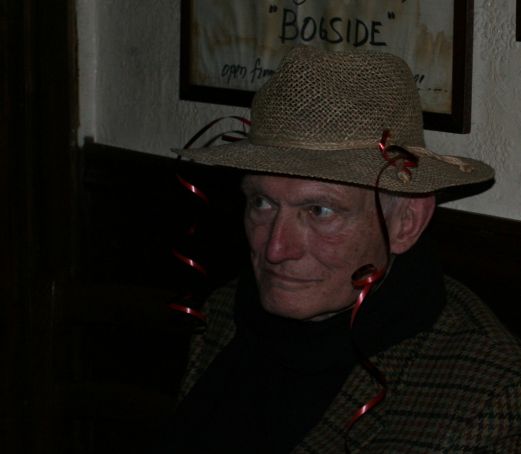
Other intriguing customers included the art historian Lee Bimm, who swilled Bloody Marys while refusing to speak to fellow Americans. When an elderly and family-less Bimm was in his final months in 2010, the humanity of Fiddler's Elbow came to the fore. A small but loyal circle of regulars would visit him on his death-bed and when he passed away the pub took care of his funeral arrangements.
Fiddler's has always been a magnet for journalists, including former CNN International anchorman Jim Clancy, who was a regular while at the Rome bureau (1982-1996) and who once introduced the pub to CNN chief international correspondent Christiane Amanpour.
Derek Wilson
Although still frequented today by senior expat figures from Italian media, the journalist best associated with the pub was the legendary Derek Wilson, il giornalista inglese.
Hard-living but always dapper and polite, Wilson's name preceded his arrival in Rome in the mid-1980s. Wilson had continued to file news from South Vietnam after the fall of Saigon – among other precarious postings such as Buenos Aires under the military dictatorship – before settling for a quieter life in Monti, where he spent his days writing articles for Wanted in Rome. Since his death in 2007 his framed obituary from The Times rests opposite the bar where he so often sat.
Big John and Rachid
The longest-serving customer awards go to Rachid Deflì, an artist from Casablanca, and John Armstead, a Kung Fu grandmaster and actor from the west of Ireland. Both have been regulars since the early days. Armstead is an imposing 73-year-old strongman, known to all as “Big John”, while the popular yet mysterious Deflì is, like Dorian Gray, noted for his ever-youthful appearance.
Celebrities
Over the decades numerous celebrities have passed through the pub's doors including tennis star John McEnroe, former British Labour leader Neil Kinnock, Irish prime minister Bertie Ahern, and the behatted British singer Jay Kay, of Jamiroquai fame, who enjoyed himself to such an extent that he ended the night on the floor.
During the 1980s the pub welcomed the cast of Dallas for extended periods while it filmed scenes in Italy, and in 1993, while filming Cliffhanger, Hollywood A-lister Sylvester Stallone hired the bar's staff to serve his private birthday party at Rome's Hilton Hotel.
Irish culture
Fiddler's hosts regular cultural events, with particular emphasis on Irish music and literature. Professor John McCourt of Università Roma Tre describes it as “one of Rome's great Irish cultural institutions”, praising its important role in supporting conferences of Irish studies and organising “lively, entertaining celebrations of Irish writing.” It has also hosted countless meetings of the Irish Club of Rome during the organisation's 25-year history.
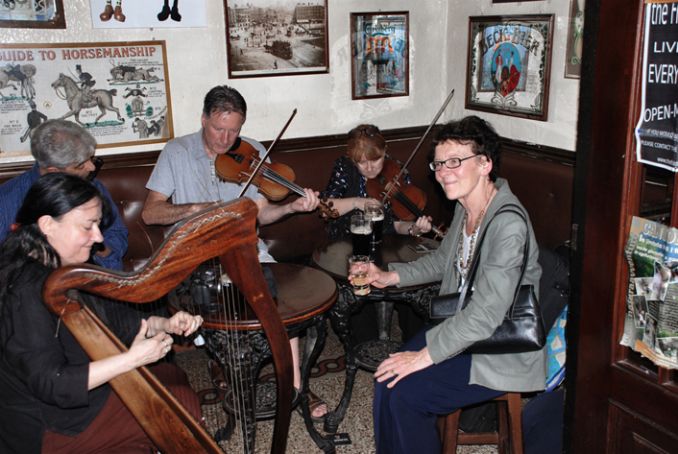
In addition the pub is home to Open Mic Rome, an opportunity each Thursday for singers, musicians and poets to perform in front of an audience. The initiative is run by musician Salvatore Benintende, who says: “It is not unusual that during a night we have over 20 musicians who cover genres from blues to jazz, from rock to swing to Irish folk.”
Exotic concept
It might be difficult to imagine for today's readers, but in the 1970s the concept of an Irish pub in Rome, with Irish beer and authentic Irish trappings, would be the modern-day equivalent of opening a tea house with Tibetan monks or a restaurant offering delicacies from the Amazon jungle. “We were exotic,” Bottigliero looks back with a sardonic chuckle, although he admits that for some early customers the prospect of meeting foreign au pair girls was as enticing as quaffing a pint of stout. Indeed the pub has been the catalyst for many romances, often between Italians and expats. A recent post about the Fiddler's Elbow anniversary on Wanted in Rome's Facebook page prompted a flurry of nostalgia and gratitude, including a comment from one lady who stated: “I met my husband here!”
Italians and expats
Fiddler's was ahead of the crowd, acting independently of Guinness marketing heads who opened a wave of pubs across Europe in the 1990s. However in recent years the Irish bar phenomenon has waned and the “Fiddler's brand has been diluted,” according to Bottigliero. There are more Italian regulars than expats now, and less business during the week.
Despite changes in drinking habits and challenges in the era of “super pubs” and loud sports bars, the Fiddler's Elbow is a bastion of quiet eccentricity and old-world charm. Marinated slowly by generations of Romans and anglophones, it remains a welcoming place where Italian and expat culture, humour and traditions collide.
This article was published in the January 2017 edition of Wanted in Rome magazine.
Fiddler’s Elbow, Via dell’Olmata 43, tel. 064872110, www.thefiddlerselbow.com.



